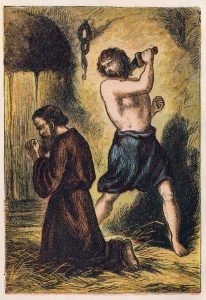What will it cost?
During a recent conference the speaker recalled a quote taken from the film The Princess Diaries, “Courage is not the absence of fear but rather the judgement that something is more important than fear; The brave may not live forever but the cautious do not live at all.” He used this quote to explain the cardinal virtue of fortitude. He went further to say that for one to exemplify fortitude one must have a stout heart, a heart that will not be confused by fear.

The Martyrdom of Saint Paul
Fortitude, unlike the theological virtues, is not a gift of God through grace but the outgrowth of habit. While it is often understood to be synonymous with courage, it is considerably different in both meaning and action. When one exhibits fortitude one always acts in a reasoned and reasonable way, willing to place one’s self in danger if necessary, but without seeking danger for danger’s sake. Fortitude is the virtue that allows us to overcome our fear and to remain steady in the face of danger; it is the courage to never give up on the good.
Fortitude is neither foolhardiness nor rashness, it is not “rushing in where angels fear to tread” but rather, as Fr. John A. Hardon, S.J., writes in his Modern Catholic Dictionary, fortitude is the “curbing of recklessness.” In other words, placing our lives in unnecessary danger is not fortitude at all but simply foolishness.
There are times in which we may be called upon to pay the ultimate price in order to save our souls. We have seen this in recent days with those Christian martyrs who have been brutally and savagely murdered for refusing to renounce their faith in Syria and Iraq. Those martyrs who died exhibited the highest form of the virtue of fortitude. While they had no desire to become martyrs for their faith they resolutely faced their deaths rather than succumb to the fear of it and in doing so they elevated their virtue beyond the cardinal to the supernatural gift of the Holy Spirit.
But the cardinal virtue of fortitude does not require or demand that one must pay the ultimate price. “It is what, as Christians, we must always have in mind in order to make our actions acceptable for eternal life. Our exercise is mainly not in war strictly so-called, but in moral courage against the evil spirit of the times, against improper fashions, against human respect, against the common tendency to seek at least the comfortable, if not the voluptuous. We need courage also to be patient under poverty or privation, and to make laudable struggles to rise in the social scale. It requires fortitude to mount above the dead level of average Christianity into the region of magnanimity, and if opportunity allows it, of magnificence, which are the allied virtues of fortitude, while another is perseverance, which tolerates no occasional remissness, still less occasional bouts of dissipation to relieve the strain of high-toned morality and religion.”[1]
Within our society today we find ourselves far removed from the imminent threat of martyrdom but whether we will or will not be called to make such an unimaginable choice, we are called by God to have the moral courage, the fortitude to combat evil in all its forms.
[1] J. Rickaby, Fortitude, Catholic Encyclopedia, http://www.ecatholic2000.com.
